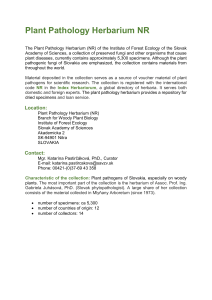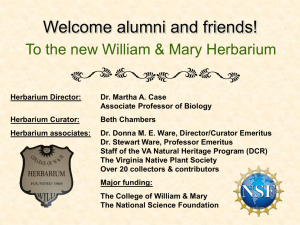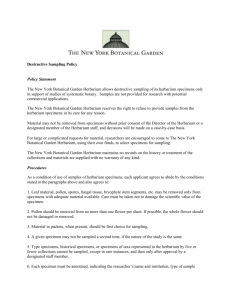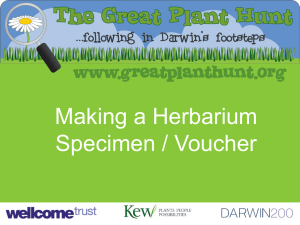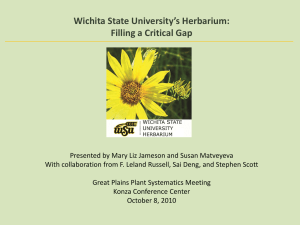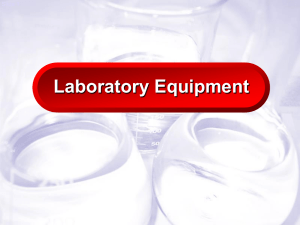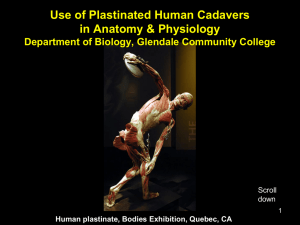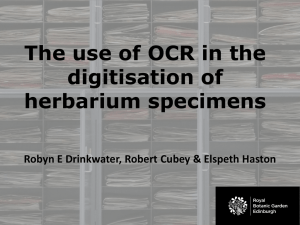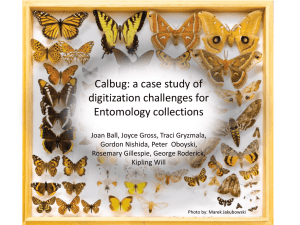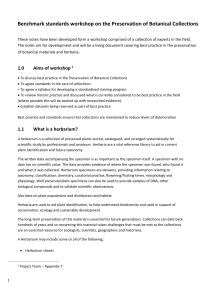WILLI - College of William and Mary
advertisement
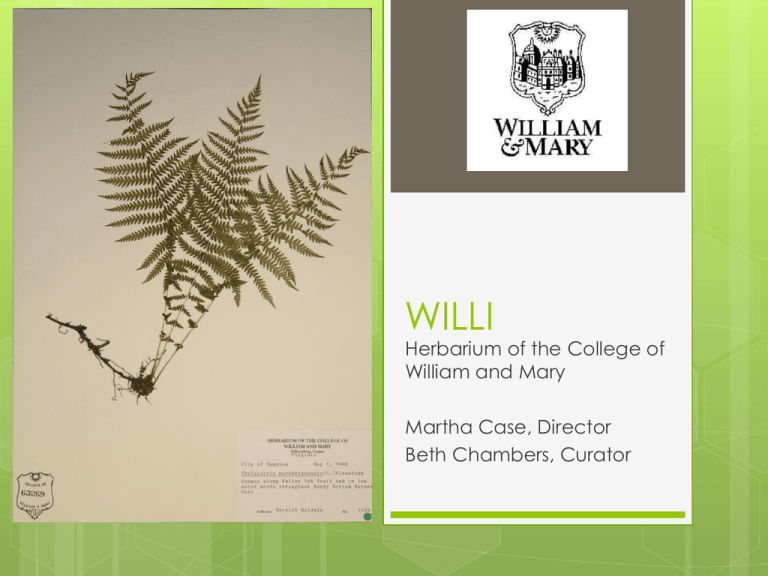
WILLI Herbarium of the College of William and Mary Martha Case, Director Beth Chambers, Curator Herbaria are repositories of dried and pressed plant specimens, archivally maintained in a “library of plants History of Herbaria Due to nature of plant biochemistry (e.g., cell wall, lignin), dried, pressed plants can last for centuries (even millennia) Plants (herbs) the earliest medicines Plant collections the first PDR Luca Ghini – Pisa Italy. Bound paper sheets with plant specimens mounted into book volumes Linnaeus started storing the paper sheets with plants mounted on them in piles, a practice followed even today. Oldest Herbaria Kassel, Germany – 1569 Universität Gesamthochschule Kassel 30,000 specimens Bologna, Italy – 1570 University of Bologna 130,000 specimens http://www.sma.unibo.it/erbario/descrizione.html University of Bologna WILLI – Index Herbariorum Identifier Index Herbariorum Started in 1935 in Netherlands, now New York Botanical Garden (NYBG) Collections of dried reference specimens of plants Collection large (usually 5,000 specimens minimum), accessible to scientists, and actively managed Loan and exchange program (similar to Interlibrary Loan program for libraries) ~ 3,990 herbaria worldwide ~ 350,000,000 specimens worldwide Document 400 years of world’s vegetation Herbaria of note Biggest: National Herbarium of Paris (Herbier National de Paris) Established in 1635! http://www.mnhn.fr/museum/foffice/trans verse/transverse/accueil.xsp?cl=en Clematis viticella collected by Lamarck – from P Herbaria of note - National NY New York Botanical Garden – Steere Herbarium - Largest in western hemisphere - 7.2 million http://sciweb.nybg.org/science2/ GH Gray Herbarium at Harvard - 5 million specimens http://www.huh.harvard.edu/ US – Smithsonian Herbarium – 4.3 million specimens http://botany.si.edu/ Dates back to founding of Smithsonian, 1847 Washington DC collection Herbaria of note - National MO Missouri Botanical Garden - 6 million specimens http://www.mobot.org/MOBOT/Research /herbarium.shtml UC - University of California and Jepson Herbarium (Berkeley) – 2.1 million specimens http://ucjeps.berkeley.edu/ FLAS – University of Florida – 470,000 specimens Herbaria of note - Regional NCU – University of North Carolina at Chapel Hill – 665,000 specimens Alan Weakley’s Manual of the Flora of the Southeastern US http://www.herbarium.unc.edu/ BRIT - Botanical Research Institute of Texas - 1 million http://www.brit.org/ Publishing upcoming Flora of Virginia Southern Methodist University herbarium now non-profit org. Took in 360,000 collection from Vanderbilt Herbaria of Note- VA VIP – Massey Herbarium of the Virginia Polytechnical Institute 134,000 specimens http://www.biol.vt.edu/herbarium/index.html Curator W&M Grad (Tom Wieboldt) Digital Atlas of Virginia through VPI (for now) http://www.biol.vt.edu/digital_atlas/ o o o VCU – Richmond – 17,700 specimens URV – Richmond – 18,000 specimens ODU – Norfolk – 28,000 specimens WILLI – College of William and Mary – 78,000 specimens http://www.wm.edu/herbarium W&M Herbarium History Herbarium founded in 1968 First Director was Gus Hall First Curator – Donna M E Ware Began with gift of 3,000 specimens from NCU Strong botanical history at W&M Second oldest college in the US, “reported to be the site of the first formal garden in the Colonies” J T Baldwin W&M ’35 JT Baldwin – Vanderbilt PhD ‘39 Back to W&M Biology Department World traveler for rubber (Hevea) in WWII Brought dawn redwood (Metasquoia glyptostroboides) to campus Many other trees on campus Collaboration with Bernice Speese (Smilax) Teaching collection started Use of herbarium specimens Verifiable records supporting many kinds of research in plant science Distributional data on plant species Rare, threatened, endangered species Invasive species Basis for descriptions of species in manuals, monographs, and other publications For construction of keys used in identification To confirm determinations Standards for consistent application of scientific names Teaching Herbarium specimens document where and when a plant grew Herbarium specimens also provide biological material for scientists to study such as: • External form and structure • Microscopic features like pollen • Variation within a particular kind of plant Even DNA itself! This allows us to understand the ecology and geographic ranges of species • For example, the counties in VA where Campanulastrum americanum has been found Herbaria are a vital resource for many kinds of research questions • Have populations of American ginseng declined in the last 150 years? research questions… • Are exotic and destructive species spreading? What species are found in the College • Woods or other areas? Herbaria are a vital resource for many kinds of research questions: • Are these three goldenrods distinct species? • Yes! Solidago altissima Solidago canadensis Solidago juncea • How do you identify species? • Which one is poison ivy? • Plant identification These specimens document species occurrences and provide material for other research projects - Such as the Flora of Virginia Project “The Flora of Virginia, with publication targeted for 2012, will describe more than 3,500 plant species in 200 families and feature 1,400 captioned, scaled, and botanically accurate illustrations” • Student research projects Lady slipper pollination studies, e.g. Specimen collecting & processing Specimen collecting & processing Link to specimen mounting demonstration (5:30 minute long video) http://www.wm.edu/as/biology/about/facilities/herbarium/volunteers/index.php Over a hundred research students and herbarium associates have contributed over 30,000 specimens to the herbarium Dr. Gretchen North “Flora of E. Middlesex Co.” 1983 Dr. Doug Soltis “Flora of the Davis Pond” 1974 Dr. Amanda Ingram “Flora of Greensprings” 1998 Christopher Johnstone “Flora of Totuskey Creek” 2008 Funding Acknowledgements • The College of William & Mary • National Science Foundation • Virginia Native Plant Society • Anonymous donors Phlox nivalis Image credits: • Botanical Society of America • Illinois Natural History Survey (ILLS) • Michael Clayton, Wisconsin State Herbarium (WIS) • Robert Bebb Herbarium (OKL) • University of Victoria herbarium (UVIC) • VA Department of Conservation & Recreation • Gary Flemming • Hal Horwitz • Keir Morse • Phillip Merritt • Troy Weldy
